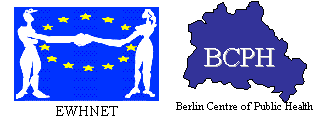

DGSMP
Gender Based Analysis (GBA) in Public Health Research,
Policy and Practice
7th - 8th
of June, 2001 in Berlin
International
Workshop organised by the Berlin Centre of Public Health*, the European
Women’s Health Network (EWHNET) and the Section Women and Health of the
German Society for Social Medicine and Prevention (DGSMP)
*The
Berlin Centre of Public Health is a joint institution of the Technical
University of Berlin, Free University of Berlin and Humboldt University of
Berlin
Brief description of the aims of the workshop
Gender-based
analysis (GBA) is a method of evaluation and interpretation which takes into
account social and economic differences between women and men, whether applied
to policy and program development, or general life activities such as
work/family roles. When GBA is applied to health policy and program
development, gender stereotypes are eliminated and socio-economic factors
affecting women's health are acknowledged. When equitable policies are applied
to the health system, this sets the stage for the provision of services
appropriate to women's needs.
In the
frame of the workshop, concepts and methods for gender based analysis in
research and practice will be presented and discussed. The aim is to make
experiences from abroad useable for Germany. Perspectives for women’s health
in Europe will be demonstrated. Theories and methods of gender sensitive
research are the main topic of the first day. Prof. Dr. Margrit Eichler from
Toronto will present her concept to identify gender bias in research. The
program of the first day will be completed by results from a study on public
health-research in Germany and examples from other European countries.
The
second day is focussed on chances and obstacles of gender based analysis in
health planning and health care, health promotion and prevention. Mary Ann
Burke will present the methods, she has developed for Canada, for detecting
gender bias and implementing gender sensitivity in health programes. European
strategies of gender mainstreaming in the health system will be discussed.
Small workshops will provide the opportunity for more intensive discussions.
Thursday, June 7, 2001
Chair: Petra Kolip
14:00
– 16:00 Afternoon
Session I
Ulrike Maschewsky-Schneider:
Welcome address on behalf of the organizers
Margrit
Eichler:
Possibilities of Measuring Gender Bias
Ulrike
Maschewsky-Schneider, Judith Fuchs:
The Project ‘Gender Bias – Gender Research’: Aims, design and results
16:30
– 19:00 Afternoon
Session II:
Gender Based
Analysis in Public Health: Implementation and Obstacles
Lea den Broeder: Gender Based Analysis in Public Health in the Netherlands
Paola
Vinay: Gender
bias in research and clinical practice in Italy
Elisabeth
Zemp:
Interdisciplinarity in Public Health and Life Sciences
Kaisa
Kauppinen: Work and
well-being - Development of quality standards to promote equality at work
19:30 Get-together
with Dinner Buffet
Friday, June 8, 2001
Chair: Ute Sonntag
9:00
– 11:00 Morning
Session I
Ute Sonntag: Opening: Application of Gender-Based Analysis in Policy and Practice
Mary
Ann Burke:
Experiences in Canada
Lesley
Doyal: Gender
Mainstreaming in Public Health policy and programs in the EU
Beate
Wimmer-Puchinger: GBA in
the implementation process of the Women’s Health Program in Vienna
Peggy
McGuire: Ways to
implement GBA in the field of Public Health
11:30
– 13:00 Morning
Session II: Working groups
What can we do? Strategies for Implementing GBA
Working
groups with impulse lectures
1. Gender-Based Analysis in Public Health-Research Lecture: Judith
Fuchs/Inge Jahn
2.
Health Care
Lecture: Joke Haafkens
3. Health Promotion and
Prevention
Lecture: Carol Hagemann-White
4. Planning and Programs
Lecture: Regina Jürgens/Ines Zimmermann
5. Mental health promotion and prevention
Lecture: Elvira Reale/Vittoria Sardelli
14:00
– 16:30 Afternoon
Session
Report
from the Working groups
Panel
Discussion: Where to go from here? - Perspectives and discussion of guidelines
Ulrike
Maschewsky-Schneider, Margrit Eichler, Lesley Doyal, Peggy McGuire, N. N.